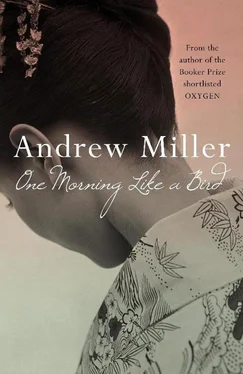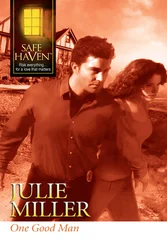Andrew Miller - One Morning Like a Bird
Здесь есть возможность читать онлайн «Andrew Miller - One Morning Like a Bird» весь текст электронной книги совершенно бесплатно (целиком полную версию без сокращений). В некоторых случаях можно слушать аудио, скачать через торрент в формате fb2 и присутствует краткое содержание. Год выпуска: 2009, Издательство: Sceptre, Жанр: Историческая проза, на английском языке. Описание произведения, (предисловие) а так же отзывы посетителей доступны на портале библиотеки ЛибКат.
- Название:One Morning Like a Bird
- Автор:
- Издательство:Sceptre
- Жанр:
- Год:2009
- ISBN:нет данных
- Рейтинг книги:4 / 5. Голосов: 1
-
Избранное:Добавить в избранное
- Отзывы:
-
Ваша оценка:
- 80
- 1
- 2
- 3
- 4
- 5
One Morning Like a Bird: краткое содержание, описание и аннотация
Предлагаем к чтению аннотацию, описание, краткое содержание или предисловие (зависит от того, что написал сам автор книги «One Morning Like a Bird»). Если вы не нашли необходимую информацию о книге — напишите в комментариях, мы постараемся отыскать её.
One Morning Like a Bird — читать онлайн бесплатно полную книгу (весь текст) целиком
Ниже представлен текст книги, разбитый по страницам. Система сохранения места последней прочитанной страницы, позволяет с удобством читать онлайн бесплатно книгу «One Morning Like a Bird», без необходимости каждый раз заново искать на чём Вы остановились. Поставьте закладку, и сможете в любой момент перейти на страницу, на которой закончили чтение.
Интервал:
Закладка:
They’ve seen it before, of course, three or four times, but that’s expected, it doesn’t matter. Nor does it matter that the film is old, because that too is expected: all the films in Feneon’s collection date from before 1929, the year his little unofficial cinema in Saigon (that amusement for the ladies and gentlemen of the Foreign Section) caught fire during the second reel of Fool’s Paradise . What matters is the ritual of being there, the occasion’s innocence, like an echo of those childhoods they have so recently left behind them.
Yuji, his back against the side of the desk, looks between Junzo’s head and Shozo’s, chuckles at the Little Tramp’s antics, then — so familiar is it all, so comfortably familiar — lets his eyes stray from the tablecloth to the gilded spines of Feneon’s library, the silk scrolls on the wall, the Khmer masks, the rack of dragon pipes above the door, the glinting brass lamps from Laos, the Thai Buddha spectral and serene in the weird moonlight of the projector, and plays his usual guessing game as to where amid this clutter, this haul of an adventurer’s life, the letter from Rimbaud is lying, lost or hidden.
Out of the Frenchman’s hearing, the club is divided on the subject. Oki, with a wave of his cigarette, with that old man’s cynicism he affects, says it’s all a tease, a game of the sort foreigners often play, and which only a simple-minded Japanese would take seriously.
Taro asks them to consider the facts. Wasn’t Feneon’s father trading in the Arabian Gulf at the same time as Rimbaud? Doesn’t his family come from Sézanne, no more than a short ride from Rimbaud’s Charleville? And why would he make up such a thing, this man who, to the best of their knowledge, is scrupulous in all his dealings?
Shozo agrees, but argues that the letter never left France, or if it did, has long since vanished, blown away on a breeze or rolled into a taper to light someone’s evening pipe in any of a dozen cities from Pondicherry to Yokohama where Feneon has lived and done business.
As for Junzo, he is predictably stubborn. For him, the letter is somewhere in the house, somewhere near at hand, and for no better reason than because Alissa Feneon has told him so. She even claimed to have read it, though was, apparently, as evasive as her father when it came to speaking of the contents.
And Yuji? He does not know, not any more. Letters are rather fragile objects. By this winter of 1940 it would be more than fifty years old. Shozo, perhaps, is right. The letter is just a family legend now, like Grandfather’s journey to Kyoto. But he cannot, not yet, give up the delightful fantasy of one day catching sight of it, a ragged envelope left as a bookmark in some long ago put-aside novel, or forgotten in a drawer of tradesmen’s receipts or carelessly left among the sun-yellowed piles of Le Figaro under the study window. And inside, in ink paled to ochre — what? Ten lines of a lost poem? Some theory of poetics to set the professors on their heels? Or even something like advice, a hint on how to live, how to write, how to live as a poet, how to be brave enough for that.
When the film is over, they troop back to the salon. On the table between the sofa and the armchairs Hanako has put out plates and glasses and a cake of fresh eggs and French chocolate, baked by Alissa in honour of the year’s inaugural meeting. Only Feneon and Alissa drink wine — it would take too long, says Feneon, to educate the young men’s palates. For them there is beer in bottles that have been plugged for an hour into the snow of the garden.
Holding up his wine to the lamplight, tilting the glass, Feneon smiles lugubriously and says, in a low voice to Yuji at his side, that this time drinking red wine will be his only contribution to the defence of his country, his only patriotic act. Yuji nods, frowns, and thinks of the photograph in the study, the one that shows what Feneon did last time, the picture of the young soldier with his blond beard leaning with one of his comrades against the tracked, man-high wheel of an artillery piece. He longs to ask him how it was, what it was like to be a soldier, whether he was scared, scared all the time, but Junzo is doing his Chaplin walk, Beatrice is leaping at his heels, Alissa is helpless with laughter, and the moment is lost.
When they have devoured the cake, they sit around the stove for the evening’s discussion. It’s Shozo’s turn to choose the subject. He removes his glasses, blinks, puts the glasses on again, and with great seriousness, in good French, tells them that the question for debate is ‘Which of all the arts should be accounted the most sublime?’
‘Well,’ says Feneon, reaching for the wine bottle, ‘that should keep us busy.’
Having proposed the question, Shozo begins a defence of folk art, in particular those ancient dances still seen at country fairs and which, in his opinion, represent an unbroken tradition stretching back to the very origins of . .
Oki rolls his eyes. Folk dances might be all right for peasant farmers in Tohoku, but for everyone else . . ‘What about architecture? The Chrysler Building, the Bauhaus . . why can’t we build like that in Tokyo? Why doesn’t Tokyo look like New York? Maybe we need another earthquake.’ He turns and quickly, in Japanese, apologises to Yuji, who excuses him with a blink and starts on his own small speech, arguing not for poetry but for what he assumes would have been Feneon’s choice. Cinema, he says, is where the arts are brought together. All the most interesting artists now are film-makers. Isn’t Jean Renoir even greater than his father, Auguste? And who in Japan deserves more attention than Yasujiro Ozu or Mikio Naruse?
He’s warming to it, beginning to enjoy himself, the sound of himself, the accent he has worked so hard at, when Alissa cuts across him. Theatre, she says, is superior to cinema because a live performance is always superior to a recorded one. However many times a play is put on, however familiar the actors are with their parts, each performance is unique.
This, thinks Yuji, is an absurd objection. (And should a nineteen-year-old girl in the company of men, all of them, with the exception of Oki, at least a little older than her, express herself in such a forthright manner? Even for a foreign girl it is surely slightly improper.) He does not look at her, but assumes the tone of a professor whose lecture has been needlessly interrupted by one of his students. All performances, he says, regardless of whether they are filmed, have, at the moment of their enactment, the self-same quality of the unique. Celluloid is but a method of preserving this, which means therefore it remains, permanently, or at least in a practical, but also perhaps in an ontological sense, even at the thousandth time of showing—
‘I’m not sure,’ says Alissa, ‘anyone understands what you’re saying.’
‘My opinion,’ says Junzo, ‘is that in debates of this type one should always side with the person who knows how to make chocolate cake.’
‘Aren’t we forgetting music?’ asks Feneon.
‘In the West you have music,’ says Oki. ‘Here we have twanging.’
‘I’d rather have the music of the shamisen ,’ says Alissa, sharply, ‘than almost anything. I’m bored to death with Schumann and Beethoven.’
‘But you play the lieder so sweetly,’ says Feneon. ‘I was lying in bed this morning listening to you.’
‘I play them very badly,’ she says, smiling at her father.
‘Won’t you play something now?’ asks Taro, the peacemaker. ‘Then we can settle this matter at once and give the prize to music.’
She shakes her head. She’s not in the mood, she’s unprepared, she does not give impromptu recitals, but Taro persists and the others join him, until, taking her stick, she gets up from the sofa, and goes to the piano. It’s an English make, Collard & Collard, an odd and lovely object that must have travelled half the world crated in the hold of some wallowing cargo vessel. She settles herself on the stool, looks put out, irritated, flicks through some pages of manuscript on the music stand, then shuts her eyes, opens them, and leans her whole body into the first soft chords. She plays for five, six minutes, no more, her head tilted to the side, an expression of intense listening on her face. The music spreads in ripples, its rhythms simple as a lullaby, light as spring rain. The debate, with its mixture of earnestness and nonsense, is forgotten. When she finishes, and the echo of the last deep note has faded, there’s a hush in which only the murmuring of the embers in the stove can be heard. They applaud. She blushes, stands, limps back to the sofa.
Читать дальшеИнтервал:
Закладка:
Похожие книги на «One Morning Like a Bird»
Представляем Вашему вниманию похожие книги на «One Morning Like a Bird» списком для выбора. Мы отобрали схожую по названию и смыслу литературу в надежде предоставить читателям больше вариантов отыскать новые, интересные, ещё непрочитанные произведения.
Обсуждение, отзывы о книге «One Morning Like a Bird» и просто собственные мнения читателей. Оставьте ваши комментарии, напишите, что Вы думаете о произведении, его смысле или главных героях. Укажите что конкретно понравилось, а что нет, и почему Вы так считаете.












